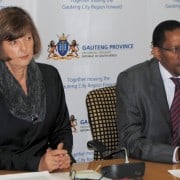|
Getting your Trinity Audio player ready...
|
The Gauteng provincial government (GPG) hosted its first open tender seminar recently, showcasing the progress the province has made in rolling out its open tender project over the past two years. The event was also aimed at encouraging other provincial governments and municipalities to adopt the process.
Attendees came from the public and private sectors and included MECs, mayors, members of the provincial legislature, heads of government departments from around the country, CEOs of public entities, and representatives of large and small businesses.
“We took the decision in 2014 that it was imperative to find ways to restore confidence in the public procurement process,” said finance MEC Barbara Creecy, who was the programme director for the day.
In 2014 the GPG committed to the overhaul of its tendering process and set the target for equal and transparent consideration of all tender bids by the end of its current term of office. “We want to get to the stage where every tender is rolled out through this process,” said Creecy at the initiative’s launch in 2014. “We won’t restore public confidence if some are and others are not.”
The initiative kicked off with the planned upgrades to Cedar Road in Sandton, a project worth more than R50-million. The entire process was conducted transparently, with the adjudication process open to tenderers and the public, who could observe although not participate.
The Cedar Road tender was awarded in April 2015. The next to go through the process was the provincial banking tender, which, too was evaluated and adjudicated openly. It was awarded in August 2015. In total 15 tenders across five government departments were thus awarded through the open system in 2015.
The GPG is set to meet its target of 100% – at the moment there are 72 tenders in the system, with a value of R10.2-billion. In the 2017/18 financial year the number will increase to 80% of all tenders, and by the end of the term in the 2018/19 financial year the GPG expects to be processing all tenders this way.
It’s vital that citizens see how their money is being spent, said finance minister Pravin Gordhan, delivering the keynote speech at the seminar. “We need to ensure that we get value for money from the taxes of the public and the borrowings we make on that money. I congratulate GPG on its determination to make procurement more transparent. The greater the spotlight that shines on procurement, the better.”
Procurement systems have come a long way, Gordhan said, and the current processes are designed to ensure an appropriate level of transparency, as well as agility and flexibility. The GPG example is important for others to emulate.
No need to bribe to get govt business in Gauteng
“High corruption takes away from development,” said premier David Makhura. “Political will is needed to fight it. Tender processes are an avenue through which state capture and corruption takes place, worldwide.”
Transparency, not secrecy, is the antidote to the disease of corruption, according to Makhura. With R47-billion at stake – the annual provincial procurement budget, including infrastructure – greater public scrutiny of budget processes will ensure that officials adhere to processes and don’t flout the rules.
“Transparency is vital to save civil servants from themselves and from capture by private and corporate interests,” Makhura said, adding that corruption has long been one of citizens’ greatest concerns and one that features prominently in surveys and dialogues.
Not only that, but there is a widespread belief, he said, that it is difficult to get a tender purely on the basis of capacity to deliver. Some businesses do not even bid for government work, because of the belief that they have to bribe to get a tender. This puts unnecessary pressure on local and national economy, as entrepreneurs and contractors struggle to survive.
“Our government is open and there is no need to bribe,” Makhura said. “In fact, if you do so it will jeopardise your chances of getting a job. All you need to do is be able to deliver.”
Used correctly, public procurement can boost economic empowerment, equity and redress, while rooting out corruption and malfeasance. But this calls for firm and decisive action. “It’s not enough to make a noise about fighting corruption, while in practice we are doing nothing.”
The open tender project is one of the specific measures GPG has put in place to promote integrity and prevent and combat corruption – others include:
- Strengthening anti-corruption units and setting up integrity management offices in every department in the Gauteng government.
- Introducing greater transparency, greater public scrutiny and greater accountability in the tendering system, now called the open tender process.
- Increasing the GPG’s capacity to monitor the prices of materials, goods and other items procured by government, because it is also there in the pricing of materials that huge corruption and collusion occurs.
- Blacklisting, publicly exposing and ensuring that civil servants and any business found guilty of corruption are prosecuted.
- Strengthening civilian oversight of law enforcement agencies, with a specific focus on stamping out corruption and removing any corrupt officers in those agencies.
Makhura stated that the 2015/16 audit outcomes showed tremendous improvement in good governance. All departments and agencies obtained unqualified audits, 60% of which are now called clean audits, and the GPG is on track to achieve 100% clean audits, he said.







